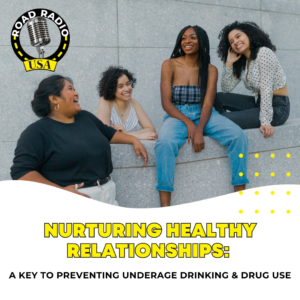 At Road Radio USA, we believe that healthy relationships are essential in guiding teenagers towards making smarter choices and leading a healthier life. Building strong connections within family relationships and friendships provides a solid foundation for young individuals to navigate the challenges they face, including the temptations of underage drinking and drug use. In this blog post, we will explore the significance of healthy relationships and provide practical tips for parents and friends to support teens in making informed decisions.
At Road Radio USA, we believe that healthy relationships are essential in guiding teenagers towards making smarter choices and leading a healthier life. Building strong connections within family relationships and friendships provides a solid foundation for young individuals to navigate the challenges they face, including the temptations of underage drinking and drug use. In this blog post, we will explore the significance of healthy relationships and provide practical tips for parents and friends to support teens in making informed decisions.
The Power of Family Relationships
Family relationships play a crucial role in shaping a teenager’s values, behaviors, and overall well-being. Strong family bonds built on trust, open communication, and mutual respect provide a supportive environment where teens can feel heard, understood, and valued. By nurturing healthy relationships within the family, parents can effectively influence their teens’ choices and encourage them to avoid risky behaviors.
- Foster open communication: Create a safe space for dialogue within the family. Encourage teens to express their thoughts, concerns, and questions without fear of judgment or punishment. Active listening and validating their emotions will strengthen the parent-teen bond.
- Set clear expectations: Establish clear rules and boundaries regarding substance use. Clearly communicate your family’s stance on underage drinking and drug use, emphasizing the potential risks and consequences. Consistency is key in reinforcing these expectations.
- Be a positive role model: Parents are powerful influencers in their teens’ lives. Demonstrate responsible behavior and healthy coping mechanisms to serve as a positive example. Show them alternative ways to have fun, cope with stress, and build self-esteem without relying on substances.
The Impact of Friendships
Friendships also have a significant influence on a teenager’s choices and behaviors. Peer relationships can either support or challenge healthy decision-making. As a friend, you have the opportunity to positively impact a teen’s life by fostering a supportive and drug-free environment.
- Encourage open conversations: Initiate conversations with your friends about the dangers of underage drinking and drug use. Raise awareness about the consequences and provide accurate information to dispel myths and misconceptions.
- Be a source of support: Be there for your friends in times of stress or peer pressure. Offer encouragement, understanding, and alternative ways to have fun and cope with challenges. Show them that they have a strong support system outside of substances.
- Plan drug-free activities: Suggest and participate in activities that promote a drug-free lifestyle. Engage in hobbies, sports, volunteer work, or creative pursuits together. By offering alternative outlets for fun and fulfillment, you help your friends make smarter choices.
- Healthy relationships, both within the family and among friends, are vital in preventing underage drinking and drug use. By fostering open communication, setting clear expectations, and being positive role models, parents can guide their teens towards a healthier path. Similarly, friends can provide support, encouragement, and drug-free alternatives, reinforcing positive choices. At Road Radio USA, we believe that by nurturing healthy relationships, we empower our youth to make informed decisions, develop resilience, and lead fulfilling lives free from the dangers of substance abuse. Together, let’s prioritize the well-being of our young generation and build a safer and healthier future.
Remember, prevention starts with us – parents, friends, and the community. Let’s join hands and create an environment that supports and uplifts our teens, helping them navigate life’s challenges while making smart choices for a brighter future.
Here are some suggestions for resources that families and friends can utilize to develop happier and healthier relationships with teens:
Books:
- “How to Talk So Teens Will Listen & Listen So Teens Will Talk” by Adele Faber and Elaine Mazlish
- “Parenting a Teen Girl: A Crash Course on Conflict, Communication, and Connection” by Lucie Hemmen
- “UnSelfie: Why Empathetic Kids Succeed in Our All-About-Me World” by Michele Borba
- “The Connected Parent: Real-Life Strategies for Building Trust and Attachment” by Lisa Qualls and Karyn Purvis
Websites and Online Resources:
- ParentFurther (www.parentfurther.com): Offers articles, tools, and resources for parents to strengthen relationships with their teens.
- Teen Mental Health (teenmentalhealth.org): Provides information, resources, and tools to support teen mental health and build positive relationships.
- Child Mind Institute (childmind.org): Offers resources and articles on various topics related to parenting and supporting mental health in children and teens.
Parenting Programs and Workshops:
- The Incredible Years (incredibleyears.com): Offers evidence-based parenting programs focused on building positive parent-child relationships and effective communication.
- Strengthening Families Program (strengtheningfamiliesprogram.org): Provides workshops and resources for families to enhance family bonding, communication, and resilience.
Counseling and Therapy Services:
- Family therapy: Engaging in family therapy sessions can help improve communication, resolve conflicts, and strengthen family relationships.
- Individual therapy for teens: Professional therapists can provide a safe and supportive space for teens to express their feelings, explore challenges, and develop healthy coping mechanisms.
Support Groups and Community Organizations:
- National Alliance on Mental Illness (NAMI) (nami.org): Offers support groups and resources for families and friends of individuals with mental health challenges, including teens.
- Local community centers and organizations: Many communities have resources and programs aimed at supporting healthy family relationships and providing guidance for parents and friends.
- Remember, seeking help and support is a sign of strength, and these resources can provide valuable insights, strategies, and guidance to help families and friends develop stronger, happier relationships with teens.